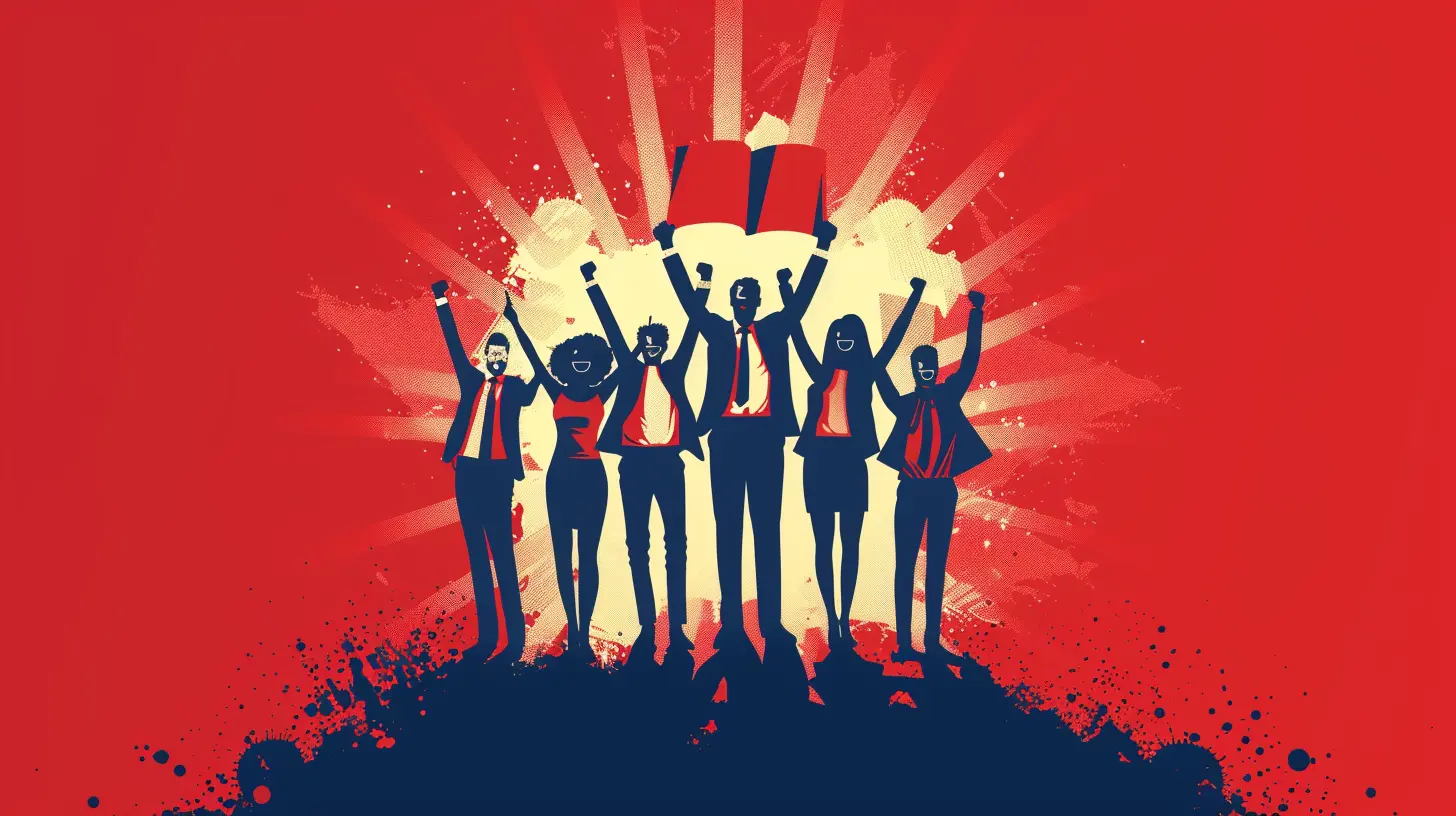The Power of Recognition: Why Acknowledging Employee Efforts Matter
31 May 2025
Ever worked your socks off, only to have your efforts go unnoticed? It's like throwing confetti into the wind—exciting for a second but ultimately disappearing into the abyss. Employee recognition is the golden ticket to workplace happiness, yet it's often overlooked.
Let’s talk about why acknowledging employee efforts isn't just a "nice-to-have" but a game-changer for engagement, productivity, and overall workplace bliss.

Why Recognition is More Than Just a Pat on the Back
Some people think workplace recognition is as simple as saying, “Hey, good job!” while giving an awkward thumbs-up. But it's so much more than that. Recognition is the secret sauce that boosts morale, strengthens loyalty, and—shockingly—keeps employees from fleeing to a competitor.Imagine a workplace without recognition: a joyless, gray, soul-draining void where employees feel like cogs in a machine. Not exactly inspiring, right?
Now, let’s dive into why giving kudos isn't just a feel-good practice but a necessity.

1. Recognition Fuels Motivation
Think about the last time someone genuinely appreciated your work. Felt good, huh? Recognition taps into our deep-seated need for validation. When employees know their efforts are seen and valued, they work harder, smarter, and with more enthusiasm.It’s like being at the gym—when someone notices your gains, you suddenly feel like lifting even heavier. The same applies in the workplace. People thrive on positive reinforcement.
The Science Behind Motivation and Recognition
Psychologists have studied this for years. The brain releases dopamine (the feel-good chemical) when we receive positive feedback. This not only makes us happy but also conditions us to repeat the behavior.So, if you want a team that’s excited to go above and beyond, hand out some well-earned praise—it’s basically free motivation fuel!

2. It Strengthens Employee Engagement
Engaged employees are like gold in the business world. They’re more productive, more innovative, and way less likely to jump ship. But here’s the kicker—engagement doesn’t just happen. It’s cultivated through appreciation and connection.Recognition makes employees feel seen, heard, and valued. And when they feel valued, they engage more with their work. Simple, yet incredibly effective.
A Real-Life Example
Ever noticed how some companies have insanely loyal employees? Companies like Google and Salesforce are famous for their strong workplace culture. One of their secrets? They make recognizing employees a priority.People stick around where they feel appreciated—it’s human nature.

3. Reduces Turnover (Because No One Likes Job-Hopping)
Here’s a fun fact: lack of recognition is one of the top reasons employees leave their jobs. It’s not always about salary or benefits. Sometimes, people just want to feel like their work matters.When employees don’t feel valued, they start browsing LinkedIn for new opportunities faster than you can say “exit interview.”
The Cost of Losing Employees
Hiring and training new employees isn’t just a hassle—it’s expensive. Studies show that replacing an employee can cost up to twice their annual salary. Yikes.So, if a simple “Great job, I appreciate your effort!” can help retain employees, why not do it more often?
4. Recognition Boosts Productivity (Because Happy People Work Harder)
A happy workplace is a productive workplace. When employees know their work is appreciated, they’re more likely to stay focused, take initiative, and actually enjoy coming to work.Think of it like watering a plant. A little acknowledgment can go a long way in helping employees flourish and perform at their best.
A Productivity-Boosting Hack
Want to supercharge productivity? Personalize your recognition. Instead of a generic “Thanks for your hard work,” try:💡 “Hey Sarah, your customer service skills this week were outstanding. The way you handled that tricky client situation with patience and professionalism was impressive!”
See the difference? The more specific, the better.
5. It Creates a Positive Workplace Culture
Ever been in an office where the vibe felt... off? Maybe people kept their heads down, conversations were minimal, and smiles were about as common as a solar eclipse. Chances are, recognition was lacking.On the flip side, companies that prioritize appreciation create an atmosphere where employees want to be.
How to Build a Culture of Recognition
- Be consistent – Recognition isn’t a one-time thing. Make it a habit.- Encourage peer-to-peer recognition – It doesn’t always have to come from leadership. Let employees uplift each other.
- Use different methods – Verbal praise, emails, awards, bonuses—mix it up!
A culture of appreciation isn’t built overnight, but with consistent effort, it transforms workplaces for the better.
6. Recognition Sparks Innovation
Want employees to think outside the box? Appreciate their ideas!People are way more likely to take creative risks when they know their contributions won’t go unnoticed. Whether it’s a groundbreaking marketing strategy or a new way to streamline processes, recognition fuels an innovative mindset.
Nothing kills creativity faster than feeling invisible. Employees who feel valued are more inclined to share ideas rather than keeping them to themselves.
7. It’s Good for Mental Well-Being
Workplace stress is real. Employees juggle deadlines, client expectations, and the occasional existential crisis (we’ve all been there). A little appreciation can go a long way in reducing stress and boosting overall well-being.Feeling unappreciated at work can lead to frustration, burnout, and low morale. On the flip side, when employees feel recognized, they experience higher levels of job satisfaction, making work a far less stressful place.
The Emotional Benefits of Recognition
- Reduces stress and anxiety- Increases job satisfaction
- Boosts confidence and self-esteem
- Strengthens workplace relationships
Essentially, a little praise doesn’t just make employees feel good—it makes them mentally healthier too!
How to Recognize Employees the Right Way
Alright, now that we’ve established WHY recognition matters, let’s talk about HOW to do it effectively.1. Make It Genuine
No one likes fake praise. Instead of tossing out generic compliments, be authentic. Employees can tell when recognition is forced.2. Be Timely
Don’t wait six months to acknowledge someone's hard work. Immediate recognition is far more impactful.3. Customize Recognition
Some employees love public praise, while others prefer a quiet “thank you.” Know your employees’ preferences and tailor your appreciation accordingly.4. Provide Tangible Rewards
While verbal praise is great, sometimes a small bonus, an extra day off, or even a coffee gift card can make a difference.5. Encourage Team-Wide Recognition
Recognition shouldn’t just come from the boss. Encourage employees to appreciate their peers—it builds camaraderie and strengthens relationships.
Wrapping It Up
At the end of the day, recognition isn’t just about making employees feel warm and fuzzy (though that’s a bonus). It’s about fostering a culture where people feel valued, engaged, and motivated to do their best work.So, the next time you see a colleague crushing it, don’t hold back—give them the credit they deserve. A little acknowledgment can go a long way in creating a thriving workplace.
Final Thought
If appreciation were a currency, it would be the most valuable one in the office. Use it generously!all images in this post were generated using AI tools
Category:
Workplace PsychologyAuthor:

Ember Forbes
Discussion
rate this article
2 comments
Aleta Castillo
Great article! Recognizing employee efforts not only boosts morale but also fosters a positive work environment. Small gestures of appreciation can lead to big changes in motivation and productivity. Let's prioritize acknowledgment in our workplaces!
June 9, 2025 at 3:58 AM

Ember Forbes
Thank you for your thoughtful comment! I completely agree—appreciation is vital for fostering a motivated and productive workplace. Let's continue to champion recognition!
Carmen Rosales
This article brilliantly underscores the profound impact of recognition on employee motivation and morale. By acknowledging efforts, organizations not only boost individual performance but also foster a culture of appreciation. Prioritizing recognition is a strategic move that enhances overall workplace satisfaction and productivity.
May 31, 2025 at 2:26 AM

Ember Forbes
Thank you for your thoughtful comment! I'm glad you found the article highlights the importance of recognition in fostering motivation and a positive workplace culture. Your insights reinforce the core message beautifully!


